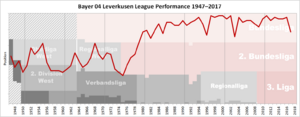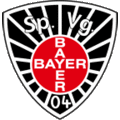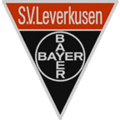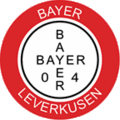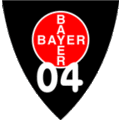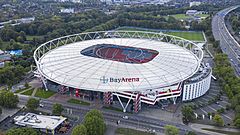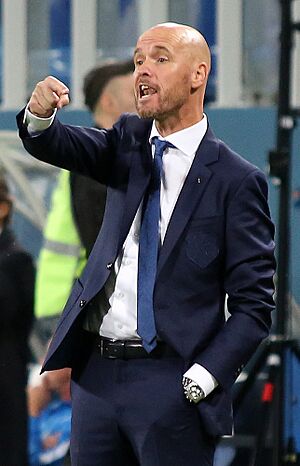Bayer 04 Leverkusen facts for kids
 |
|||
| Full name | Bayer 04 Leverkusen Fußball GmbH | ||
|---|---|---|---|
| Nickname(s) | Die Werkself (The Factory XI) Die Schwarzroten (The Black and Reds) |
||
| Founded | 1 July 1904 | ||
| Ground | BayArena | ||
| Capacity | 30,210 | ||
| Owner | Bayer AG | ||
| Chairman | Fernando Carro | ||
| Sporting director | Simon Rolfes | ||
| Coach | Erik ten Hag | ||
| League | Bundesliga | ||
| 2020–21 | Bundesliga, 6th of 18 | ||
|
|
|||
Bayer 04 Leverkusen, often called Bayer Leverkusen or just Leverkusen, is a professional football club from Leverkusen, Germany. They play in the Bundesliga, which is the top football league in Germany. Their home games are held at the BayArena.
The club was started in 1904 by workers from the Bayer pharmaceutical company. This company is where the club gets its name. Bayer Leverkusen's main colors are red and black. They have big rivalries with clubs like 1. FC Köln and Borussia Mönchengladbach.
Bayer Leverkusen joined the Bundesliga in 1979. They won their first major European trophy, the UEFA Cup, in 1988. In 1993, they won their first German cup, the DFB Pokal. In 2002, they finished second in three different competitions, including the UEFA Champions League.
After many years without winning a big trophy, the club had an amazing season in 2023–24. They won their first ever Bundesliga title and their second DFB Pokal. They made history by being the first German team to win the league without losing a single game. They also set a European record for the longest unbeaten run in all competitions, going 51 games without a defeat.
In the 2024–25 season, Bayer Leverkusen won the DFL-Supercup for the first time. However, their domestic unbeaten streak ended, and they finished the season without winning the Bundesliga or DFB-Pokal. Xabi Alonso, their successful coach, left the club at the end of that season. On 1 July 2025, Erik ten Hag became the new head coach.
Contents
Club History
How it Started
On 27 November 1903, a worker named Wilhelm Hauschild wrote a letter. He and 180 other workers asked the Bayer company to help them start a sports club. The company agreed, and on 1 July 1904, Turn- und Spielverein Bayer 04 Leverkusen was founded. This was a sports club for the company's employees.
In 1907, a separate football section was created within the club. Over time, there were disagreements between gymnasts and other athletes. This led to a split in 1928. The footballers formed their own group called Sportvereinigung Bayer 04 Leverkusen. This new group also included handball, fistball, athletics, and boxing. The footballers kept the club's traditional red and black colors.
Through the 1930s, SV Bayer 04 Leverkusen played in the third and fourth divisions. In 1936, they moved up to the second-highest league. That year, they also started wearing the "Bayer" cross on their kits, which is still seen today. They first played in the top league, the Oberliga West, in 1951. They stayed there until 1956 before being moved down a league.
SV Bayer 04 Leverkusen returned to the top leagues in 1962. This was just one season before Germany created its new professional league, the Bundesliga. The next year, the club played in the Regionalliga West, which was the second tier.
Moving Up to the Bundesliga
In 1968, SV Bayer 04 Leverkusen won their division title. However, they couldn't move up to the first division that year. The club was moved down again in 1973. But they quickly returned to what was then called the 2. Bundesliga after just one season. Four years later, in 1979, the club earned a spot in the Bundesliga. They started playing there in the 1979–80 season.
By the mid-1980s, SV Bayer 04 Leverkusen was a strong team in the Bundesliga. In 1984, the two parts of the club that had split earlier came back together. They formed TSV Bayer 04 Leverkusen e.V. The new club chose red and white as its colors.
The club won its first big trophy in 1988, the UEFA Cup. They were losing 0–3 after the first game of the final against Espanyol. But Bayer Leverkusen came back to tie the second game and then won the title in a penalty shootout.
After 1990, the club signed talented players like Ulf Kirsten, Andreas Thom, and Jens Melzig. They also brought in Brazilian stars like Jorginho and Paulo Sérgio. Famous German players like Bernd Schuster and Rudi Völler also joined. These players helped the team become more popular and successful.
The club won its next major trophy in 1993. They beat Hertha BSC's amateur team 1–0 in the DFB-Pokal final. In the next season, the team started wearing its "retro" red and black striped jerseys. These colors became very popular with fans and have been used on all home jerseys ever since.
After a tough season in 1996 where they almost got moved down a league, Bayer Leverkusen became a very strong team. They played an exciting attacking style of football under coach Christoph Daum. Players like Lúcio, Emerson, Zé Roberto, and Michael Ballack helped a lot.
"Neverkusen" Years
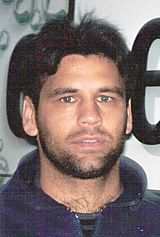
From 1997 to 2002, Leverkusen finished second in the league four times. In 2000, they only needed a draw to win the Bundesliga title. But they lost 2–0, and Bayern Munich won the title instead. Two years later, in 2002, they were leading the league by five points. However, they lost two of their last three games, and Borussia Dortmund won the title.
The 2002 season was especially tough for Leverkusen. They also lost 4–2 in the DFB-Pokal final to Schalke 04. Then, they lost the UEFA Champions League final 2–1 to Real Madrid. Because of these close calls, some people started calling them "Neverkusen". Leverkusen was the first team to reach the Champions League final without ever winning their national league. Also, five players from Bayer Leverkusen were on the Germany team that lost the World Cup final in 2002.
Recent Years
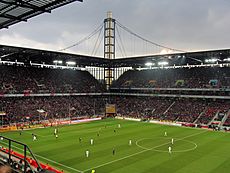
After the 2002 season, key players Michael Ballack and Zé Roberto moved to Bayern Munich. Klaus Toppmöller, who coached the team during their successful year, was replaced. The team finished third the next year and qualified for the Champions League.
In the 2004–05 Champions League, Leverkusen started well by beating Real Madrid 3–0. They won their group but were knocked out by Liverpool in the next round.
In October 2005, Michael Skibbe became the new manager. He helped the team improve and finish sixth in the league in 2006 and fifth in 2007, earning a spot in the UEFA Cup both times.
The 2007–08 season was not as good. Skibbe was criticized for changing the team too much. He was fired in May 2008 because the team did not qualify for the UEFA Cup.
The 2008–09 season started well under new manager Bruno Labbadia. However, they struggled against top teams in the Bundesliga. Leverkusen reached the DFB-Pokal final but lost 0–1 to Werder Bremen. Labbadia left in June 2009.
Jupp Heynckes became the new manager. In the 2010–11 season, Bayer Leverkusen finished second in the league. This meant they qualified for the Champions League again. Heynckes then left to coach Bayern Munich. In the 2012–13 and 2015–16 seasons, Leverkusen finished third. They were knocked out in the Champions League round of 16 both times. In the 2019–20 UEFA Europa League, Leverkusen reached the quarter-finals but lost to Inter Milan.
Xabi Alonso's Unbeaten Run

In October 2022, with the team struggling, Leverkusen hired Xabi Alonso as head coach. This was his first time managing a senior team. He helped the team avoid being moved down a league and they finished sixth.
The 2023–24 was amazing for Leverkusen under Alonso. They signed important players like Granit Xhaka, Victor Boniface, Jonas Hofmann, and Alejandro Grimaldo. The team set a new club record for the longest unbeaten start to a season. They then broke the Bundesliga record for the longest unbeaten run in all competitions with 26 games. They also broke the European record for top leagues, going 43 games without a loss.
On 14 April 2024, Leverkusen won the Bundesliga title for the first time ever. They beat Werder Bremen 5–0. This ended Bayern Munich's streak of 11 league titles in a row. This was Leverkusen's first trophy since 1993. On 9 May 2024, Leverkusen set a new European record for the longest unbeaten run in football history (51 games). They finished the league season without losing a single game, which was a first for the Bundesliga.
Their amazing unbeaten streak ended in their 52nd game of the season. They lost 3–0 to Atalanta in the Europa League final. However, they won the 2024 DFB-Pokal final by beating 1. FC Kaiserslautern. This meant they won both the league and the German cup in the same season.
At the start of the 2024–25 season, on 17 August 2024, the team won the DFL-Supercup for the first time. They beat VfB Stuttgart in a penalty shootout. However, their domestic unbeaten run ended on 31 August 2024 with a 3–2 loss to RB Leipzig. The 2024-25 season was less successful for Leverkusen. They did not win the Bundesliga title, which went back to Bayern Munich. Bayern also beat them in the Champions League. Leverkusen also lost in the semi-finals of the DFB-Pokal. Xabi Alonso left the club at the end of the season.
On 26 May 2025, Leverkusen announced that Erik ten Hag would be their new head coach. He started his job on 1 July 2025.
Club Logos
Club Culture
Unlike many German football clubs that have strong ties to working-class roots, Bayer Leverkusen tries to have a clean, family-friendly image. The BayArena is known as one of the most family-friendly football stadiums in Germany.
Some people criticize Bayer Leverkusen for being a "plastic club." They say it doesn't have old traditions or a strong fan base. They believe it exists only because of its rich sponsor, Bayer AG. Because of this, the club and its fans have started to be proud of their industrial beginnings. They call themselves "Werkself" (meaning "Factory team") or "Pillendreher" (meaning "Tablet twisters").
However, Bayer Leverkusen is not the only club started by a company. Other clubs like PSV and Sochaux also began as company teams. Unlike some newer clubs created mainly for business reasons, Bayer Leverkusen was formed to help the local factory workers in the early 1900s. Because of this history, UEFA allows Bayer Leverkusen to use the "Bayer" brand name in European competitions.
Charity Work
In March 2020, Bayer Leverkusen, along with Borussia Dortmund, Bayern Munich, and RB Leipzig, gave €30 million. This money helped other Bundesliga teams that were having financial problems during the COVID-19 pandemic.
Club Achievements
In Germany
League Titles
- Bundesliga
- 2. Bundesliga North
- Champions: 1978–79
Cup Titles
- DFB-Pokal
- Winners: 1992–93, 2023–24
- Runners-up: 2001–02, 2008–09, 2019–20
- DFL-Supercup
- Winners: 2024
- Runners-up: 1993
In Europe
- UEFA Champions League
- Runners-up: 2001–02
- UEFA Cup / UEFA Europa League
- Winners: 1987–88
- Runners-up: 2023–24
Youth Team Achievements
- German Under 19 Championship
- Winners: 1986, 2000, 2007
- Runners-up: 1995, 2001, 2003, 2010
- German Under 17 Championship
- Winners: 1992, 2016
- Under 19 Bundesliga
- Winners: 2007, 2010
Players
Current Squad
|
|
Players on Loan
|
|
Club Records
Players in bold are currently playing for the team.
|
|
Coaching Staff
| Position | Staff |
|---|---|
| Head coach | |
| Head of performance | |
| Assistant head coach | |
| Goalkeeper coach | |
| Fitness coach | |
| Analysis | |
| Analyst first-team squad | |
| Head of sports science and Athletics | |
| Licence Coordination | |
| Team Doctor | |
| Physiotherapist | |
| Support Staff | |
| Team Manager |
Other Sections
- Bayer 04 Leverkusen (women) - The women's football team.
- TSV Bayer 04 Leverkusen (handball) - The women's handball team.
- Bayer Giants Leverkusen (basketball) - The basketball team.
- Works team - Learn about sports teams started by companies.
- Leverkusen - The city where the club is located.
See also
 In Spanish: Bayer Leverkusen para niños
In Spanish: Bayer Leverkusen para niños
 | Mary Eliza Mahoney |
 | Susie King Taylor |
 | Ida Gray |
 | Eliza Ann Grier |


